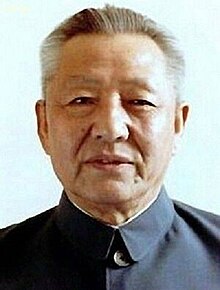
Back شي تشونغ شون Arabic Si Čung-sün Czech Xi Zhongxun German Xi Zhongxun Spanish Xi Zhongxun French Xi Zhongxun ID Xi Zhongxun Icelandic 習仲勲 Japanese 시중쉰 Korean Xi Zhongxun Dutch
Xi Zhongxun | |
|---|---|
习仲勋 | |
 Xi in the 1990s | |
| Vice Chairman of the Standing Committee of the National People's Congress | |
| In office 10 September 1980 – 15 March 1993 | |
| Chairman | Ye Jianying→Peng Zhen→Wan Li |
| Communist Party Secretary of Guangdong | |
| In office November 1978 – November 1980 | |
| Preceded by | Wei Guoqing |
| Succeeded by | Ren Zhongyi |
| Governor of Guangdong | |
| In office January 1979 – February 1981 | |
| Preceded by | Wei Guoqing (as Director of the Guangdong Provincial Revolutionary Committee) |
| Succeeded by | Liu Tianfu |
| 1st Secretary-General of the State Council | |
| In office September 1954 – January 1965 | |
| Premier | Zhou Enlai |
| Preceded by | Li Weihan |
| Succeeded by | Zhou Rongxin |
| 14th Head of the Publicity Department of the Chinese Communist Party | |
| In office January 1953 – July 1954 | |
| Party Chairman | Mao Zedong |
| Preceded by | Lu Dingyi |
| Succeeded by | Lu Dingyi |
| Personal details | |
| Born | 15 October 1913 Fuping County, Shaanxi, Republic of China |
| Died | 24 May 2002 (aged 88) Beijing, People's Republic of China |
| Political party | Chinese Communist Party (joined in 1928) |
| Spouse(s) | Hao Mingzhu Qi Xin |
| Children | 7, including Qi Qiaoqiao, Xi Jinping and Xi Yuanping |
| Military service | |
| Branch/service | Chinese Red Army |
| Unit | Guominjun |
| Commands | Chinese Red Army First Field Army |
| Battles/wars | |
| Xi Zhongxun | |||||||||||||
|---|---|---|---|---|---|---|---|---|---|---|---|---|---|
| Simplified Chinese | 习仲勋 | ||||||||||||
| Traditional Chinese | 習仲勲 | ||||||||||||
| |||||||||||||
Xi Zhongxun (Chinese: 习仲勋; pinyin: Xí Zhòngxūn; 15 October 1913 – 24 May 2002) was a Chinese communist revolutionary and politician who was the 1st Secretary General of the State Council from 1954 to 1965; Communist Party Secretary of Guangdong from 1978 to 1980; and vice chairman of the Standing Committee of the National People's Congress from 1980 to 1993. His second son, Xi Jinping, is the General Secretary of the Chinese Communist Party since 2012.
He is considered to be among the first and second generation of Chinese leadership.[1] The contributions he made to the Chinese communist revolution and the development of the People's Republic, from the founding of Communist guerrilla bases in northwestern China in the 1930s to initiation of economic liberalization in southern China in the 1980s, are numerous and broad. He was known for political moderation and for the setbacks he endured in his career. He was imprisoned and purged several times.
- ^ Đình Nguyễn. "Tập Cận Bình – 'Lãnh đạo tương lai' của Trung Quốc" (in Vietnamese). Vnexpress. Retrieved 19 October 2010.